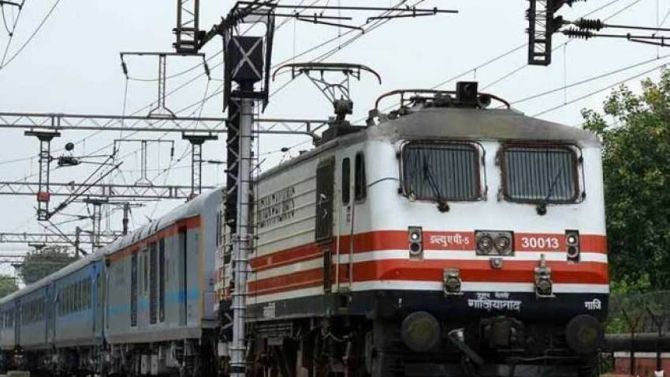 | « Back to article | Print this article |
Though the Railways is yet to declare any five-year action plan, it is clear the government is not in a position to hand-hold it for any major expansion or upgrade.
The issue, however, is how far the Railways can function within the PPP format.
Recent history highlights some of the challenges.

The Narendra Modi government has set the Indian Railways on course for private participation to meet its funding needs, underlining the long understood realisation that the exchequer alone cannot finance infrastructure building and its operations.
But unlike other infrastructure sectors, the Railways’ public-private participation (PPP) record has been patchy and difficult to implement.
Yet the need for some sort of partnership is becoming urgent.
In her July 5 Budget speech, Union Finance Minister Nirmala Sitharaman said the Railways needed Rs 50 trillion in five years to 2030.
But she admitted to the government’s inability to meet the requirement: Current railway capital expenditure has been Rs 1.5-1.6 trillion annually.
“Completing even all sanctioned projects would take decades.
"It is, therefore, proposed to use public-private partnership to unleash faster development and completion of tracks, rolling stock manufacturing and delivery of passenger freight services,” Sitharaman said in the speech.
Though the Railways is yet to declare any five-year action plan, it is clear the government is not in a position to hand-hold it for any major expansion or upgrade.
The issue, however, is how far the Railways can function within the PPP format.
Recent history highlights some of the challenges.
In the 90s, for instance, the Indian Railways created partnerships with private companies for sidings, warehousing and wagons, and then extended the tie-ups for port railway lines.
But operating the service under the law remained with the Indian Railways.
This was the reason the Pipavav Railway Corporation Limited (PRCL) was set up as a special purpose vehicle (SPV) in May 2000 as a 50 per cent joint venture between the Indian Railways and the Gujarat Pipavav Port Limited (GPPL).
The SPV was given the task of converting a meter gauge line between Surendranagar and Rajula City to broad gauge and extending it to the Pipavav port.
The company also manages all operations and commercial functions relating to freight traffic on the 271-km line.
A special dispensation from the Cabinet Committee on Economic Affairs allowed PRCL to undertake construction, operations and maintenance of the broad gauge railway system.
It is entitled to the rights, obligations and duties of a railway administration.
These PPP initiatives were insignificant when seen in the larger context of the Indian Railways.
Attempts at getting big-ticket private investment in locomotive manufacturing took eight long years, when the Indian Railways under Suresh Prabhu awarded two marque contracts for manufacturing locomotives in 2015 to GE Transportation and Alstom.
Part of the reason for the delay was lack of investor interest.
The contracts went through several rounds of bidding because there were either no bids or a single bid.
The two locomotive projects, however, are more in the nature of contract manufacturing and not equity investment in partnership with the government.
So why does the Railways struggle with PPPs? According to Vishwas Udgirkar, partner, Deloitte India, the institution’s complicated and complex structure is the principal cause.
“The proposed revenue models and the way the Railways responds and wants to remain in control make it difficult,” he says.
Even the much-touted station redevelopment could not take off on account of low investment appetite in the construction sector.
After altering the terms for station redevelopment at least twice, the Railways had to finally sign on with government companies for the job.
There are some 22 stations that are being taken up through Indian Railways Station Development Corporation. NBCC and Ircon would take over two stations.
Most of the other stations are undergoing upgrades rather than redevelopment.
If station redevelopment projects, which have the incentive of real estate development attached to them, are finding it hard to get private investors, getting them to run rail service would be even tougher because of legal and operational challenges.
The Railway Act does not allow private companies to operate, though there are reports of the government inviting private investment in running premier trains, such as the Tejas, Shatabdis and Rajdhanis and tourist trains.
M Ramachandran, a former secretary in the Union urban development ministry, says since the ownership of tracks remains with the Railways running only a passenger service even as the same tracks are used for freight makes the task difficult for investors.
“The Railways will need to resolve these issues. A lot would depend on the terms of contract.”
Rather than actually running trains, private operators could be acting as aggregators, taking bookings and owning the rolling stock, on the lines of private container trains.
Even so, any form of private investment will need a viable fare model requiring tariff revisions and bankable contracts.
This, however, raises the need to first put in place a regulator.
The fact that private operators could not run the much-smaller metro services in Delhi and Gurugram makes successfully-run private rail services a distant dream.
Photograph: PTI Photo